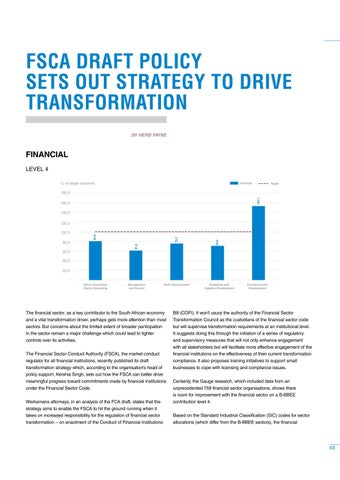FSCA DRAFT POLICY SETS OUT STRATEGY TO DRIVE TRANSFORMATION BY HERB PAYNE
FINANCIAL LEVEL 4 % of target achieved
Financial
Target
153,1
180,0 160,0 140,0 120,0
60,0
70,6
61,4
80,0
75,7
81,0
100,0
40,0 20,0 Black Ownership: Equity Ownership
Management and Control
Skills Development
The financial sector, as a key contributor to the South African economy and a vital transformation driver, perhaps gets more attention than most sectors. But concerns about the limited extent of broader participation in the sector remain a major challenge which could lead to tighter controls over its activities. The Financial Sector Conduct Authority (FSCA), the market conduct regulator for all financial institutions, recently published its draft transformation strategy which, according to the organisation’s head of policy support, Kershia Singh, sets out how the FSCA can better drive meaningful progress toward commitments made by financial institutions under the Financial Sector Code. Werksmans attorneys, in an analysis of the FCA draft, states that the strategy aims to enable the FSCA to hit the ground running when it takes on increased responsibility for the regulation of financial sector transformation – on enactment of the Conduct of Financial Institutions
Enterprise and Supplier Development
SocioEconomic Development
Bill (COFI). It won’t usurp the authority of the Financial Sector Transformation Council as the custodians of the financial sector code but will supervise transformation requirements at an institutional level. It suggests doing this through the initiation of a series of regulatory and supervisory measures that will not only enhance engagement with all stakeholders but will facilitate more effective engagement of the financial institutions on the effectiveness of their current transformation compliance. It also proposes training initiatives to support small businesses to cope with licensing and compliance issues. Certainly, the Gauge research, which included data from an unprecedented 759 financial sector organisations, shows there is room for improvement with the financial sector on a B-BBEE contribution level 4. Based on the Standard Industrial Classification (SIC) codes for sector allocations (which differ from the B-BBEE sectors), the financial
43










